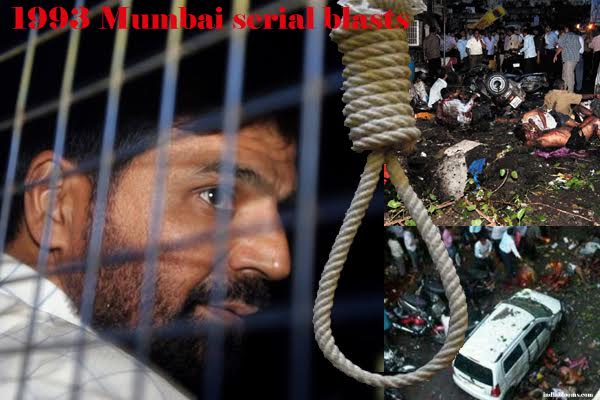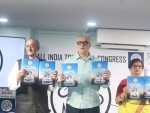April 26, 2024 01:56 (IST)

Execution of Yakub Memon cruel and inhuman: Amnesty International
New Delhi, July 30 (IBNS) The execution of 1993 Mumbai serial blasts convict Yakub Memon marks another disheartening use of the death penalty in India, said Amnesty International India on Thursday.
Yakub Abdul Razak Memon was executed by hanging this morning at the Nagpur Central jail.
The 53-year-old was convicted for his involvement in a series of bomb blasts in Mumbai in March 1993 which killed 257 people.
In 2007, he was convicted and sentenced to death under the Terrorist and Disruptive Activities (TADA) Act. Amnesty International said the TADA law contained provisions incompatible with international fair trial standards.
“This morning, the Indian government essentially killed a man in cold blood to show that killing is wrong,” said Aakar Patel, Executive Director, Amnesty International India.
“This execution will not deliver justice for the 1993 Mumbai blasts. It is a misguided attempt to prevent terrorism, and a disappointing use of the criminal justice system as a tool for retribution.”
Several concerns around the execution were raised by activist groups, including issues of whether courts had considered all relevant circumstances during sentencing, and the length of Yakub Memon’s detention.
“Indian authorities often find it convenient to hold up capital punishment as a symbol of their resolve to tackle crime, and choose to ignore more difficult and effective solutions like improving investigations, prosecutions and care for victims’ families,” said Aakar Patel.
Yakub Memon’s execution is the third in under three years in India, after an eight-year hiatus. India is among a minority of countries which continue to use the death penalty. 140 countries, more than two-thirds of the world’s countries, around the world have abolished the death penalty in law or practice.
Amnesty International says it opposes the death penalty in all cases without exception, regardless of the nature or circumstances of the crime; guilt, innocence or other characteristics of the individual; or the method used by the state to carry out the execution. It says it opposes it as a violation of the right to life as recognized in the Universal Declaration of Human Rights and the ultimate cruel, inhuman and degrading punishment
The 53-year-old was convicted for his involvement in a series of bomb blasts in Mumbai in March 1993 which killed 257 people.
In 2007, he was convicted and sentenced to death under the Terrorist and Disruptive Activities (TADA) Act. Amnesty International said the TADA law contained provisions incompatible with international fair trial standards.
“This morning, the Indian government essentially killed a man in cold blood to show that killing is wrong,” said Aakar Patel, Executive Director, Amnesty International India.
“This execution will not deliver justice for the 1993 Mumbai blasts. It is a misguided attempt to prevent terrorism, and a disappointing use of the criminal justice system as a tool for retribution.”
Several concerns around the execution were raised by activist groups, including issues of whether courts had considered all relevant circumstances during sentencing, and the length of Yakub Memon’s detention.
“Indian authorities often find it convenient to hold up capital punishment as a symbol of their resolve to tackle crime, and choose to ignore more difficult and effective solutions like improving investigations, prosecutions and care for victims’ families,” said Aakar Patel.
Yakub Memon’s execution is the third in under three years in India, after an eight-year hiatus. India is among a minority of countries which continue to use the death penalty. 140 countries, more than two-thirds of the world’s countries, around the world have abolished the death penalty in law or practice.
Amnesty International says it opposes the death penalty in all cases without exception, regardless of the nature or circumstances of the crime; guilt, innocence or other characteristics of the individual; or the method used by the state to carry out the execution.
Support Our Journalism
We cannot do without you.. your contribution supports unbiased journalism
IBNS is not driven by any ism- not wokeism, not racism, not skewed secularism, not hyper right-wing or left liberal ideals, nor by any hardline religious beliefs or hyper nationalism. We want to serve you good old objective news, as they are. We do not judge or preach. We let people decide for themselves. We only try to present factual and well-sourced news.
Support objective journalism for a small contribution.
Latest Headlines
Plea filed in Calcutta HC seeking action against Mamata Banerjee's 'judges purchased' remark Fri, Apr 26 2024
'Most compassionate and kind': Musician Ricky Kej on Ratan Tata after conferring humanitarian award Thu, Apr 25 2024
Bollywood actor Neha Sharma campaigns for her father in Bihar amid rumours of poll debut Thu, Apr 25 2024
LS polls: 88 seats across 13 states, UTs going to polls tomorrow for phase 2; 1202 candidates in fray Thu, Apr 25 2024
'Neither shocked nor surprised': Mallikarjun Kharge writes open letter to PM Modi over Congress manifesto row Thu, Apr 25 2024
'Biased, reflects poor understanding': India dumps US report on alleged rights abuse Thu, Apr 25 2024
6 killed in hotel fire near Patna Junction railway station Thu, Apr 25 2024







